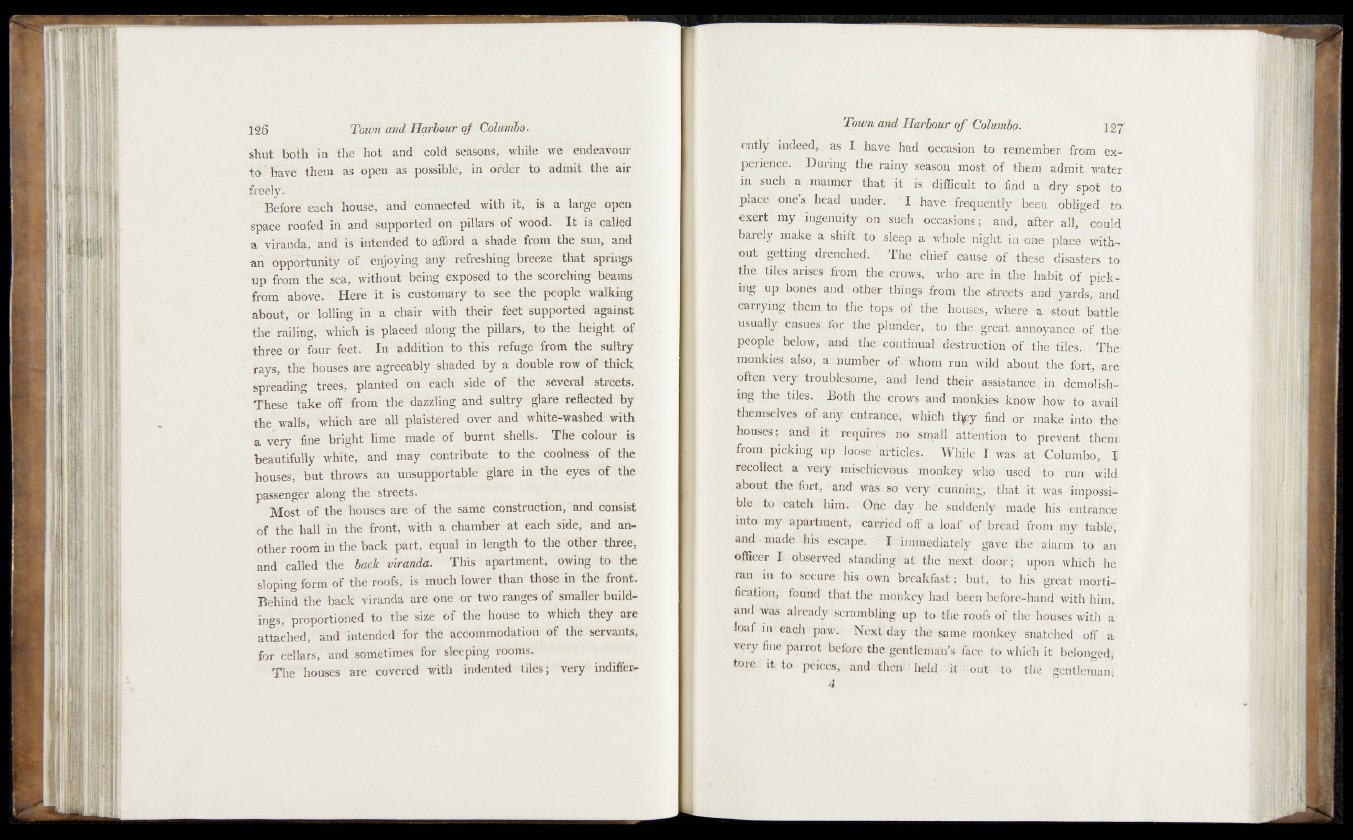
shut both in the hot and cold seasons, while we endeavour
to have them as open as possible, in order to admit the air
freely.
Before each house, and connected with it, is a large open
space roofed in and supported on pillars of wood. It is called
a viranda, and is intended to afford a shade from the sun, and
an o p p o rtu n ity ^ Enjoying any refreshing breeze that springs
up from the Sea, without being exposed to the scorching beams
from above. ' Here it- is customary to seè thé people walking
about, or lolling in a chair with their feet supported against
the railing, which is placed along~the pillars, to the height of
three or four feet. In addition to this refuge from the sultry
rays, the houses are agreeably shaded by a double row óf' thick
Spreading trees, planted on each side of the several streets.
These take off from the dazzling and sultry glare reflected by
the walls, which are all plaistcred over and white-washed with
a very fine bright lime made of burnt' shells. The colour is
beautifully white, and may contribute to the coolness of the
houses, but throws an unsuppprtable' glare in the eyes of the
passenger along the' streets.
Most of the houses are of the same construction, “and consist
of the hall in the front, with a chamber at each side,* and another
room in the back part, equal in length to the other three,
and called tlié back viranda. This apartment, owing to the
slojping form of the röoB^is' much lower than those in the front’.
Behind the back viranda afe One or two ranges of Smaller build.-
ihgs, proytortiönéd to the size óf thé house to which they are
attached, and intended for the accommodation of the servants,
for cellars, and sometimes for sleeping rooms.
The houses are covered with indented tiles ; very indiffeur
cntly indeed, as I have (had occasion to remember.' from experience.'
During the rainy season most;: pf them, admit water
in such a r manner that it bis* difficult to ’ find a »dry spot to
place ofres head 'Under. T have <frequen€y?igbeen obliged CtOi
qxert my ingenuity i®n such*'occasions-; and*/ after all, 'ipaulcf
barely make a. shift; tto sleep la^hdfl'e night in-fohb^place« with-*
Opt getting drenched. The chief cause pf dhese-disasters tcf
the tiles, arises from the-erows, .whoif&e da-the liabit of - pick-
htg .up. bones and,rother things* from the Streets and1 yards, dnd
carrying 4hem tor (the frips, off the fh©ui|s,' where a «fdut battle
usually ensues, for the plunder,: ted fhen^eafc* annoyance- of -the'
people below, and .the^eantimial 'destruction ofrltlfontilesi: The
monkies also1, a/number of- whom run wild about'the 'fort,.arè'
• Often .very troublesome*; /and lend their assistance/demolish-;
ing the tilesi Both the -crows and ffiOnkies know < how tp.' avail?
themselves of < any. entrance;- >whfoh tlpy had .dn -make drffof the?
hoiraes; and -.it' requires no- small at&mion tch-prevent* them,
from picking upSloosl 'articles. While I ' WaV a t ‘ Columbo, J.
recollect, a'rvery mischie¥©us ffiOnkey who*4t»ad 4*tm wild
.about the »’fort, • and was-so' veryncurinili^ that'it Was impo&fc
ble-.-tohcateh hirr)- ©he day he suddenly made his /entrance
i®to>;my apartment, canned off a loaf of-fbnëad;; from, my table,’
an^ lïi3<^e hisfescape*.' I*'immediately gave the^alarm td 'am
dsfficer Iubbf&r'ted - standing^-'the next door> upon; which hé
ran 'in- to-^eenre ; his s own breakfast?;-' but, to -his /great mortification;
found' that the mbnkpy had beenbefore^band'vvith him,
and "was hli^adyiserambliiig up/ to the roofs of the »houtjes with a-
loaf in each pawns -Next day *-the' shme mönkéy sh^öhéd ;pff!i a
very fine ^ak»ot--.'i3efesfe-.<tjhe: geWÜemtói's/ üce ïéöiwhtèh'i« belo-ngèd*
tore: ïtctot; p e i c e s , v * B ' d K « i ö i l i t l i é ^eiitlèmam
4